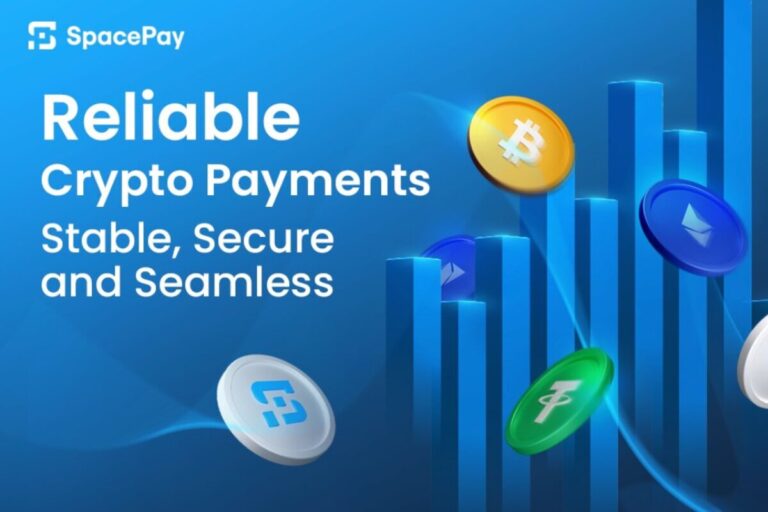Which Crypto to Invest In by Year-End: SpacePay’s Practical Payment Solution

Most crypto projects promise the moon but deliver nothing you can actually use in real life.
SpacePay out of London went after a problem that has existed since Bitcoin first showed up. They built a system that lets merchants take crypto payments using whatever card reader is already sitting on their counter. Business owners don’t need to buy new equipment, figure out complicated tech stuff, or stress about Bitcoin crashing overnight.
With year-end coming up, projects that actually do something useful start looking a lot better than the hundreds of speculative tokens clogging up the market.
Why Most Crypto Payments Still Don’t Work
Roughly 400 million people hold cryptocurrency globally, yet trying to spend it at a physical store remains nearly impossible. The disconnect isn’t about lack of demand. Plenty of crypto owners would love to buy lunch with their digital assets, and plenty of business owners would welcome new customers.
The existing solutions just make everything too complicated. Most crypto payment systems demand that merchants buy expensive new equipment, train staff on unfamiliar technology, and somehow become blockchain experts overnight. Small business owners see these requirements and decide to stick with credit cards.
And then there’s the whole volatility thing that freaks everyone out. Take a $100 Bitcoin payment today, wake up tomorrow, and it’s worth $85. Business owners hate that kind of unpredictability, especially when rent and supplier bills come due at the same time every month.
Which Crypto to Invest In: Real Utility Matters
When searching for the crypto to invest in before year-end, projects that solve actual problems deserve closer attention than purely speculative plays. SpacePay focuses on making cryptocurrency payments work in the real world rather than just creating another token for trading.
The platform integrates with Android-based terminals that millions of shops already use daily. A quick software update turns any existing card reader into a crypto-accepting device. Restaurants, retail stores, service businesses – they can all start taking digital currency payments without replacing their current systems.
SpacePay supports over 325 different cryptocurrency wallets. Customers use whatever app they already have installed. Whether someone prefers MetaMask, Trust Wallet, or something else, the payment goes through smoothly every time.
The instant conversion feature removes volatility concerns completely. When a customer pays with Ethereum or Bitcoin, SpacePay converts it to regular currency within seconds. Merchants receive dollars or euros immediately, never holding any cryptocurrency that could lose value overnight.
SpacePay’s Presale Gains Momentum
The $SPY token presale has pulled in over $1.4 million so far, and nobody paid influencers to hype it up. That kind of organic interest usually means people actually believe in what’s being built rather than just chasing the next pump.
The presale works in stages, with each round costing a bit more than the last. Get in early, and you pay less. Wait around and you’ll end up paying more for the same tokens.
SpacePay One Testnet Proves the Concept Works
SpacePay One Testnet launched recently, allowing developers and interested users to test the payment system firsthand. The V1 version includes a working payment widget built with an API-first approach and a smooth checkout experience.
Right now, the testnet runs on Base Sepolia and Ethereum Sepolia networks. Anyone can visit the testing platform and see exactly how transactions flow through the system. The team recommends using the desktop for now since they’re still fixing some mobile bugs.
This testnet forms the backbone of SpacePay’s goal to enable instant, gasless crypto-to-fiat payments globally. Having functional software running before asking for investment dollars separates serious projects from vaporware. Too many crypto ventures launch with flashy websites but no actual product to show.
The team actually asks for feedback through their Telegram community. That kind of openness usually means they’re building something meant to last, not just looking to cash out fast.

Transaction Fees That Actually Make Sense
Most credit card processors charge between 2% and 4% per transaction. These fees hit small businesses particularly hard since they’re already operating on thin margins. SpacePay charges 0.5%, which changes the math significantly.
Think about a busy pizza place doing $30,000 a month. Regular payment processors grab anywhere from $600 to $1,200 in fees. SpacePay only takes $150. That difference could buy ingredients, keep the lights on, or bring in another person for the dinner rush.
The fee structure stays transparent with no hidden charges appearing later. Business owners know exactly what each transaction costs from day one. This clarity helps with financial planning and budgeting, especially for smaller operations that watch every expense.
Lower processing costs can trickle down to customers too. When merchants aren’t hemorrhaging money to payment companies, they have more flexibility with pricing. Everyone benefits when transaction fees shrink.
Getting Into the $SPY Presale
Anyone wanting to get involved can head to SpacePay’s website and hook up their crypto wallet – MetaMask and WalletConnect both work fine. They take Ethereum, Binance Coin, Polygon, Avalanche, Tether, and USD Coin. Don’t have crypto? Just use a regular bank card.
Tokens cost $0.003181 each right now. The price goes up with each presale stage, so earlier participants get better rates. After connecting your wallet, enter how much you want to invest and confirm through your wallet. Save your transaction records for claiming tokens later.
Join the SpacePayY ($SPY) on (X) Twitter and Telegram.
Disclaimer: This publication is sponsored. Coinspeaker does not endorse or assume responsibility for the content, accuracy, quality, advertising, products, or other materials on this web page. Readers are advised to conduct their own research before engaging with any company mentioned. Please note that the featured information is not intended as, and shall not be understood or construed as legal, tax, investment, financial, or other advice. Nothing contained on this web page constitutes a solicitation, recommendation, endorsement, or offer by Coinspeaker or any third party service provider to buy or sell any cryptoassets or other financial instruments. Crypto assets are a high-risk investment. You should consider whether you understand the possibility of losing money due to leverage. None of the material should be considered as investment advice. Coinspeaker shall not be held liable, directly or indirectly, for any damages or losses arising from the use or reliance on any content, goods, or services featured on this web page.